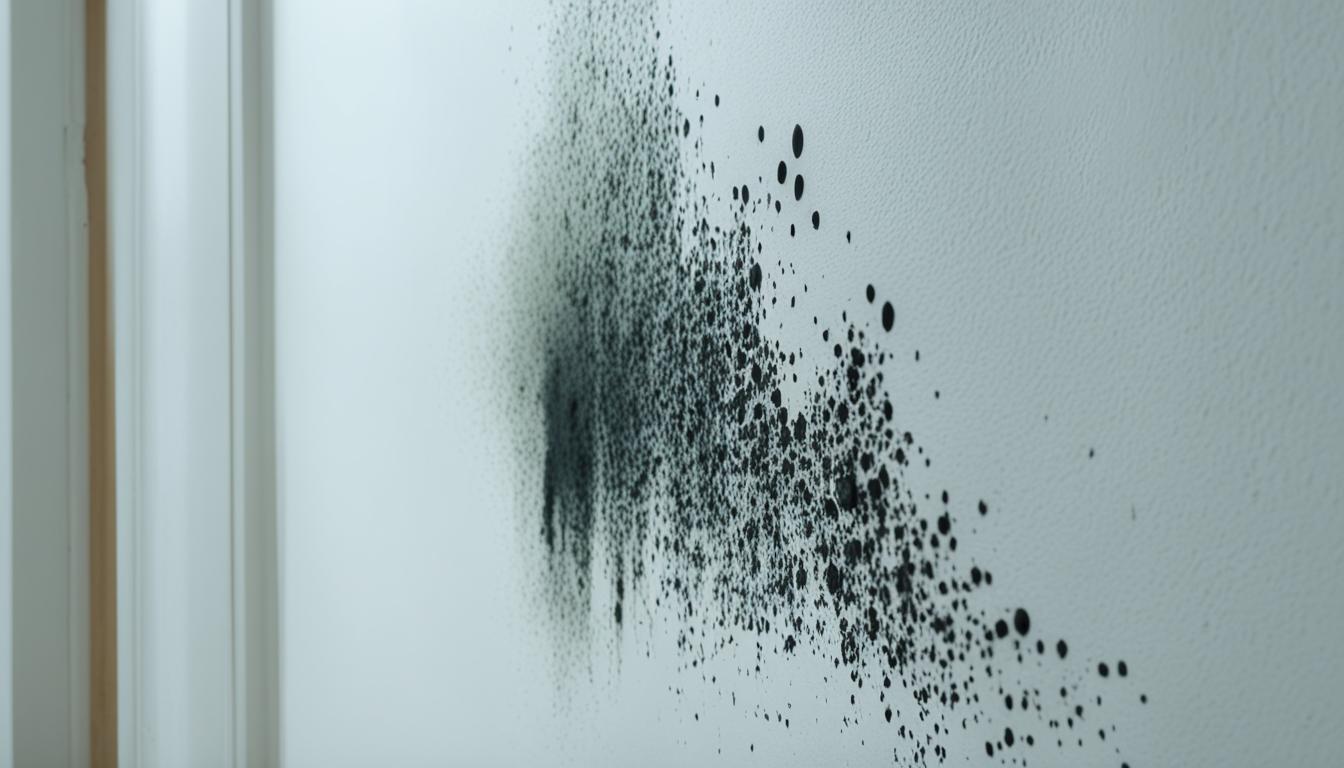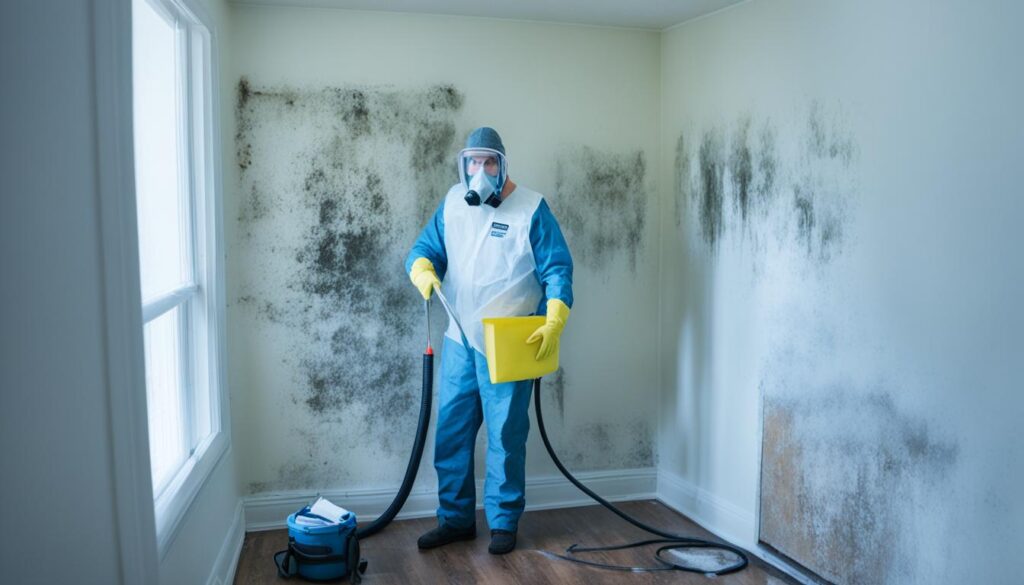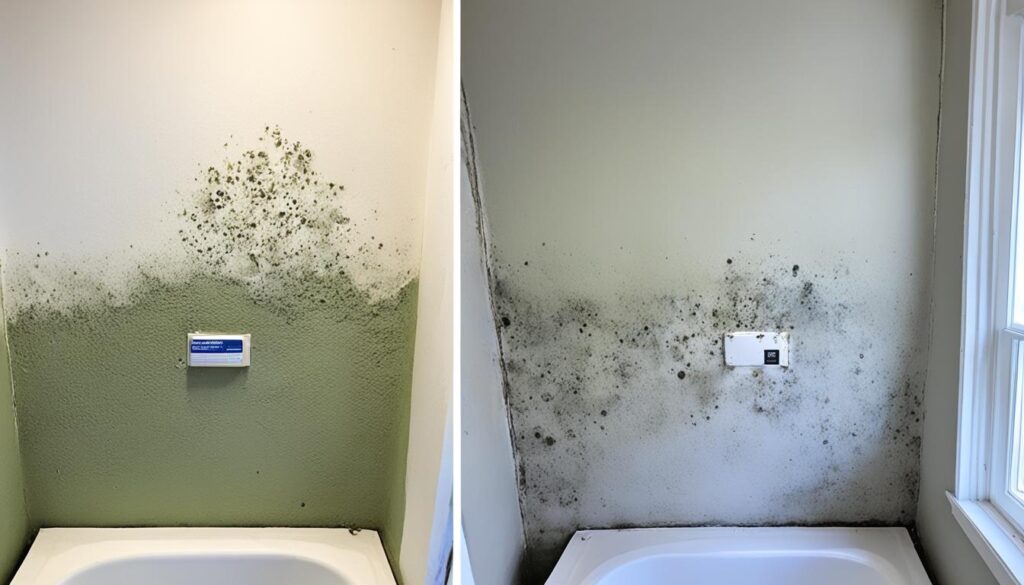
Landlord’s Duty to Fix Mold in Your Apartment
In this section, we will explore the duty of landlords to address mold issues in rental apartments. We will discuss the responsibilities of landlords, relevant mold remediation laws, and the rights of tenants in cases of mold infestation. Additionally, we will cover the landlord’s legal obligations for mold cleanup and the potential disputes that can arise between tenants and landlords regarding mold repair in rental apartments.
Key Takeaways:
- Landlords have a responsibility to address mold issues in rental apartments.
- There are specific laws and regulations that govern mold remediation in rental properties.
- Tenants have rights when it comes to mold infestation and can take legal action if necessary.
- Mold removal in rental apartments should be carried out by professionals.
- Open communication and negotiation are key to resolving mold disputes between tenants and landlords.
Understanding Landlord Responsibilities for Mold
As a landlord, it is crucial to be aware of your responsibilities when it comes to addressing mold issues in rental apartments. Not only does this ensure compliance with the law, but it also helps provide a safe and habitable living environment for your tenants.
One of the primary responsibilities of landlords is to promptly address any mold problems that arise in rental properties. This includes taking immediate action to identify the source of the mold infestation and implementing effective remediation measures. By doing so, you can prevent further mold growth, protect the health of your tenants, and maintain the value of your rental property.
Tenants also have rights when it comes to mold infestation. They have the right to live in a mold-free environment that does not pose a threat to their health. If tenants report mold, it is the landlord’s responsibility to investigate and take appropriate action to resolve the issue.
Resolving mold disputes between tenants and landlords can be challenging, but communication and cooperation are key. It is important for both parties to understand their rights and responsibilities to find a fair and satisfactory resolution. In some cases, mediation or legal intervention may be necessary to achieve the desired outcome.
Landlord Responsibilities for Mold: A Summary
| Landlord Responsibilities |
|---|
| 1. Promptly address mold issues in rental properties. |
| 2. Identify and rectify the source of the mold infestation. |
| 3. Implement effective mold remediation measures. |
| 4. Provide a safe and habitable living environment for tenants. |
| 5. Cooperate with tenants and communicate openly to resolve mold disputes. |

By understanding and fulfilling your responsibilities as a landlord, you can effectively address mold issues in rental apartments and maintain a positive landlord-tenant relationship. Ensuring a mold-free environment not only protects the health and well-being of your tenants but also establishes your credibility as a responsible and reliable landlord.
Mold Remediation Laws and Regulations
When it comes to addressing mold issues in rental properties, landlords must adhere to specific laws and regulations. These mold remediation laws are in place to ensure the health and safety of tenants while outlining the legal obligations that landlords have for mold cleanup and prevention.
“Landlords are responsible for maintaining a safe and habitable living environment for their tenants, which includes addressing mold issues promptly and effectively.”
One of the key aspects of mold remediation laws is the requirement for landlords to properly clean up and prevent mold in rental apartments. This involves not only removing visible mold but also addressing the underlying causes, such as water leaks or moisture buildup, to prevent future mold growth.
In cases of mold infestation, tenants have specific rights that protect their health and well-being. These rights include the right to request mold inspections, the right to prompt mold remediation, and the right to pursue legal action if their landlord fails to address mold issues in a timely and satisfactory manner.
Landlords have legal obligations to ensure that mold is properly removed and prevented in rental apartments. Failure to fulfill these obligations can result in legal consequences and potential disputes between landlords and tenants.
Preventing Mold in Rental Apartments
To prevent mold growth in rental apartments and comply with mold remediation laws, landlords can take proactive measures, such as:
- Regularly inspecting and maintaining the property to identify and address any water leaks or moisture issues promptly.
- Providing proper ventilation in areas prone to higher humidity, such as bathrooms and kitchens.
- Repairing any structural damage that may contribute to water intrusion or moisture buildup.
- Responding promptly to tenant complaints or reports of mold growth.
By following these preventive measures and fulfilling their legal obligations, landlords can create a safe and healthy living environment for their tenants, free from mold infestation.
Steps for Mold Removal in Rental Apartments
In order to effectively remove mold in rental apartments, it is essential to follow a systematic process that ensures thorough cleanup and prevents future mold growth. Here are the recommended steps for rental property mold removal:
- 1. Professional Mold Assessment: Begin by hiring a certified mold inspector to assess the extent of the mold problem in the rental apartment. This assessment will help determine the appropriate remediation measures required.
- 2. Develop a Remediation Plan: Based on the mold assessment report, collaborate with a professional mold remediation company to create a comprehensive plan for mold cleanup. The plan should include the specific areas to be treated, the remediation methods to be used, and a timeline for completion.
- 3. Inform the Tenant: It is crucial to communicate with the tenant about the mold issue and the steps being taken to address it. Keep the tenant informed throughout the process to maintain transparency and trust.
- 4. Implement Remediation Measures: The mold remediation company will carry out the cleanup according to the developed plan. This may involve removing affected materials, such as drywall or carpeting, and thoroughly cleaning and treating the remaining surfaces.
- 5. Encourage Tenant Cooperation: During the remediation process, tenants should follow any instructions given by the mold remediation team. This may include temporarily vacating the premises or minimizing moisture sources to prevent further mold growth.
- 6. Conduct Post-Remediation Verification: Once the mold cleanup is complete, hire a certified mold inspector to conduct a post-remediation verification (PRV) assessment. This ensures that the mold has been successfully removed and the rental apartment is safe for occupancy.
- 7. Document the Remediation Process: Maintain detailed documentation of all mold removal procedures, including assessment reports, remediation plans, and any communication with the tenant. These records serve as evidence of compliance with legal obligations and can be helpful in case of any future disputes.
By following these steps and working with professionals, landlords can fulfill their legal obligations for mold cleanup in rental apartments, ensuring a safe and healthy environment for their tenants.

| Mold Removal Steps | Description |
|---|---|
| Professional Mold Assessment | Hire a certified mold inspector to assess the extent of the mold problem in the rental apartment. |
| Develop a Remediation Plan | Create a comprehensive plan for mold cleanup in collaboration with a professional mold remediation company. |
| Inform the Tenant | Communicate with the tenant about the mold issue and the steps being taken to address it. |
| Implement Remediation Measures | Carry out the mold cleanup according to the developed plan, removing affected materials and treating remaining surfaces. |
| Encourage Tenant Cooperation | Instruct the tenant to cooperate during the remediation process by following any given instructions. |
| Conduct Post-Remediation Verification | Hire a certified mold inspector to assess the success of the mold removal and ensure the rental apartment is safe. |
| Document the Remediation Process | Maintain detailed records of all mold removal procedures, assessments, and communication with the tenant. |
Resolving Mold Disputes Between Tenants and Landlords
When it comes to mold in rental apartments, disputes between tenants and landlords can sometimes arise. Common issues such as responsibility for mold prevention, the extent of mold remediation, and disagreements over repair costs can lead to conflicts. However, it’s crucial for both parties to find amicable solutions to these disputes in order to maintain a healthy living environment and a positive landlord-tenant relationship.
Common Issues Leading to Mold Disputes
There are several common issues that can lead to mold disputes between tenants and landlords:
- Responsibility: Determining who is responsible for mold prevention and remediation can be a source of contention. Tenants may argue that landlords are responsible for maintaining a mold-free environment, while landlords may argue that tenants have a duty to prevent mold growth through proper cleanliness and ventilation.
- Extent of Remediation: Disputes can also arise regarding the extent of mold remediation required. Tenants may believe that a superficial cleanup is insufficient and demand a more thorough approach, while landlords may view a surface treatment as adequate.
- Repair Costs: Another issue that often arises is the allocation of repair costs. If mold growth is attributed to tenant negligence or failure to report the issue promptly, landlords may argue that tenants should bear the financial burden. On the other hand, tenants may claim that inadequate maintenance or underlying structural issues are the cause, placing the responsibility on the landlord.
Steps to Resolve Mold Disputes
Resolving mold disputes between tenants and landlords requires open communication and a willingness to find common ground. Here are some steps both parties can take:
- Document the Issue: Tenants should document the presence of mold by taking photographs, noting the date and time, and reporting it to the landlord in writing. Landlords should promptly acknowledge the complaint and take appropriate action.
- Seek Mediation: If direct communication fails to resolve the dispute, seeking mediation services may be beneficial. A neutral third party can help facilitate constructive discussions and guide both parties towards a resolution.
- Review Lease Agreements: Carefully review the lease agreement to determine the specific responsibilities of each party regarding mold prevention and remediation. This can provide clarity and assist in resolving the dispute based on the agreed-upon terms.
- Consider Professional Mold Testing: In complex cases, it may be necessary to hire a professional mold testing company to assess the extent and cause of the mold growth. The findings can serve as valuable evidence in resolving the dispute.
- Consult Legal Advice: If all attempts at mediation fail, it may be necessary to consult legal advice. A lawyer specializing in landlord-tenant disputes can provide guidance on the tenant’s rights and legal options available, helping to navigate the resolution process.
Open communication, a proactive approach, and a genuine desire to find a fair resolution are key in resolving mold disputes between tenants and landlords. By working together, both parties can ensure a safe and healthy living environment.
Conclusion
In conclusion, it is vital for landlords to understand and fulfill their duty to address mold issues in rental apartments. By taking prompt action and adhering to mold remediation laws, landlords can ensure a safe and healthy living environment for their tenants.
Tenants, on the other hand, should be aware of their rights and take appropriate measures if they encounter mold infestation in their rental properties. It is essential for them to document the issue, communicate with their landlords, and if necessary, seek legal assistance to protect their well-being.
Resolving mold disputes requires open communication between tenants and landlords. Through dialogue and negotiation, both parties can work towards a fair and satisfactory resolution. However, if disputes cannot be resolved through discussions, tenants have legal options available to them to seek the appropriate remedies.
If you are in need of professional mold assessment or remediation services in Miami, we recommend contacting Fix Mold Miami at 305-465-6653. Their expertise and experience can help ensure thorough mold removal and create a healthier living space for both tenants and landlords.




